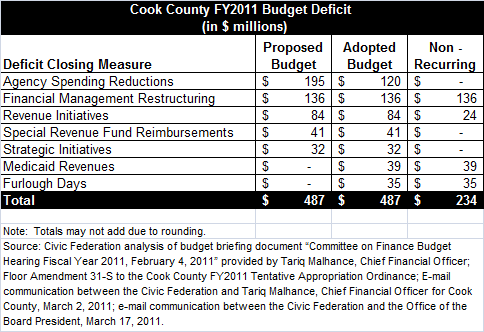March 25, 2011
The Cook County Modernization 100-Day Accountability Report is a follow up report to the Civic Federation’s October 2010 Cook County Modernization Report. The new publication assesses the progress the County has made toward implementing the recommendations contained in the October report during the first 100 days of Board President Preckwinkle’s administration. As previously discussed in this blog, the County has made very significant progress, but is far from being able to be declared stable.
The Civic Federation has reported previously on the factors that are likely to lead the County to face continued budget shortfalls. As part of the Accountability Report the Civic Federation did further analysis on those factors, including the use of non-recurring methods. The Civic Federation uses the term non-recurring to describe measures that are not structural in nature and that will not be available on an ongoing basis. Nearly half the budget gap closing measures in the FY2011 adopted budget are non-recurring.

The County began the budget process with a projected $487 million budget deficit. The proposed budget included $160 million in non-recurring deficit closing measures; budget amendments added another $74 million of non-recurring measures.
Below are details of the measures used to close the FY2011 projected budget deficit. Nearly half of the adopted budget deficit closing measures are non-recurring measures. The County notes that although these measures are not permanent budgetary solutions, some of them are more than just one-time solutions and have the potential to be available again for upcoming budgets.[1]
- Financial Management: The County expects to receive $85 to $90 million from debt restructuring and $45 million from a line of credit. The $45 million is to fund a one-time cost for a large settlement related to the jails.[2] The bond restructuring is expected to generate revenue for three fiscal years, but will result in higher future debt service payments.
- Revenue Initiatives: Included in the revenue initiatives is $23.7 million in TIF surplus declared by the City of Chicago. TIF surplus funds have been categorized as non-recurring revenue because there is no guarantee the City will declare a TIF surplus in future years.
- Furlough Days: To reduce the number of layoffs, the adopted budget as passed by the Board of Commissioners includes 10 unpaid furlough days for non-essential County employees that are equivalent to $35 million in savings.[3] Although some governments, such as the City of Chicago, have continued to use furlough days for multiple years they do not constitute a permanent structural solution.
- Medicaid Revenues: A budget amendment added approximately $40 million in Medicaid revenue.[4] The Health System subsidy would be reduced by up to $39 million of the revenue received. Essentially the Medicaid revenues would serve as a revenue source for general operations. The $39 million will be used to further reduce the number of layoffs in addition to what was attained through furlough days.[5] The County notes that there is an ongoing dialogue with the State that could result in additional Medicaid revenue in future budget years.[6]
The use of the non-recurring measures in the FY2011 budget means that the County will face further budget shortfalls in the future.
